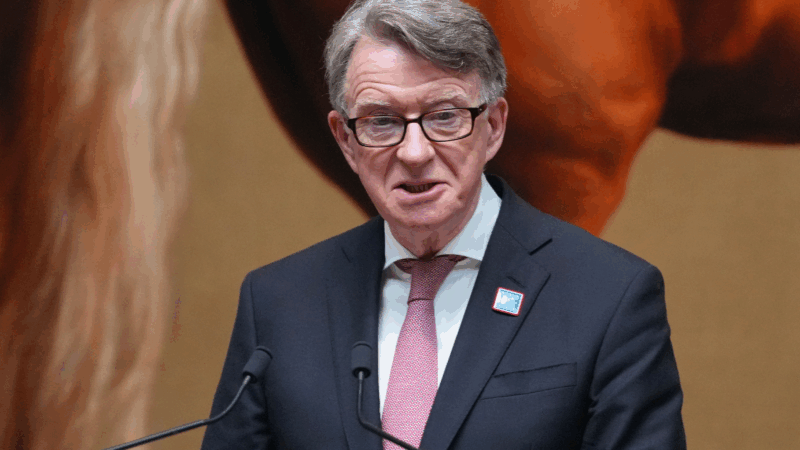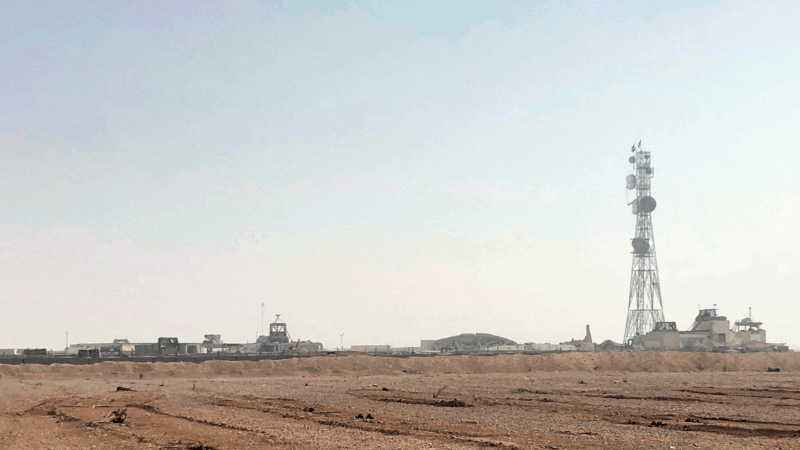Peace in the South
It’s early on a Saturday morning and organizers with the Birmingham Peace Project are taking care of last minute details before their bus leaves for a peace march in Atlanta. It may be gray and rainy outside, but inside the bus, the mood is relaxed and cheerful.
(singing “We all live in a terrorist regime”)
“I value what there is here, greatly, the people that get together, even though there is a small minority, to come together and do this…”
Peace activist Joyce Smith grew up in Alabama and worked here as a teacher. But she’s also lived outside the South and says the peace movement gets more traction in other places.
“I do think there are a lot of people in the South that are against the war, but, for one reason or another, don’t want to speak out against it. I did, however, live in Oregon and people did speak freely and frequently spoke out against the war, so there was always an opportunity…”
“This is after all a hierarchical and patriarchal society and in such societies, doing what your told, obeying the established authorities plays a really strong role in the culture.”
Alabama historian Wayne Flint says there are many reasons the peace movement might be an uneasy fit in the South:there’s the South’s sense of nationalism, a history of outdoor hunting and dueling when one’s honor is challenged…But one reason really gets him going: economics.
“The Southern states as a whole, the Deep South in particular, Alabama most notably have disproportionately high rates of poverty. And wherever you have poverty, you have…very high rates of people participating in the military. People who cannot go to college, cannot flourish in other economic and educational activities often go to the military…”
Flynt believes the military presence in the South–that’s both people who grew up here and military officers who retire here from other places-contributes to an environment where people holding anti-establishment views may be less likely to speak out.
“Because so many soldiers and military personnel come from this area; I think it becomes much more difficult for people to stand against what their sons, daughters, spouses, brothers, sisters are doing.”
Local attorney David Gespass is chairman of the Birmingham Peace Project.
“It’s really, just emotionally difficult for someone to say that a loved one is in harm’s way, is killing and subject to being killed, unless the cause is just and noble.”
Wayne Flynt agrees. He says rather than looking at the war as merely a policy issue, people in the South make it personal.
“A peace activist is not just somebody who says government’s policies are wrong. In the South such a person is seen as a…traitor to the country…”
If they know they’re seen as traitors, you can’t tell from the way they’re behaving at the peace march in Atlanta. More than 3700 activists walk from the King Center to Piedmont Park singing loudly, dancing, and holding up banners. The group is diverse-there are people of different ethnicities and ages. High schoolers walk alongside aging hippies. A cutout of Martin Luther King bobs through the crowd.
Still, the number of peace marchers pales in comparison to the estimated 50,000 demonstrators who showed up this week in Atlanta for an immigration rally. For many, the immigration issue is alive in this country. The war, though waging on, is far away.
For U.S. pairs skater Danny O’Shea, these Olympics are 30 years in the making
Danny O'Shea turned 35 at his first Olympics, after three decades of skating and two reversed retirements.
Want a mortgage for under 3% in 2026? Meet the ‘assumable mortgage’
Low mortgage rates from the COVID era might still be attainable for homebuyers, if they find the right house and have the cash.
Epstein files fallout takes down elite figures in Europe, while U.S. reckoning is muted
Unlike in Europe, officials in the U.S. with ties to Epstein have largely held their positions of power.
Four people on NASA’S Crew-12 arrive at the International Space Station
The crew will spend the next eight months conducting experiments to prepare for human exploration beyond Earth's orbit.
American speedskater Jordan Stolz wins second Olympic gold with 500-meter race victory
With the win, Stolz joins Eric Heiden as the only skaters to take gold in both the 500 and 1,000 at the same Olympics.
US military reports a series of airstrikes against Islamic State targets in Syria
The U.S. military says the strikes were carried out in retaliation of the December ambush that killed two U.S. soldiers and one American civilian interpreter.






